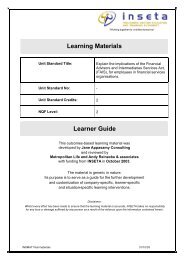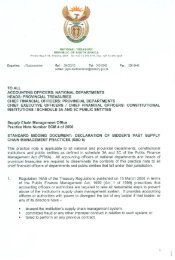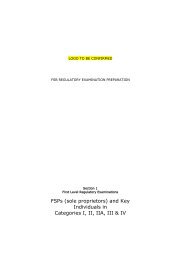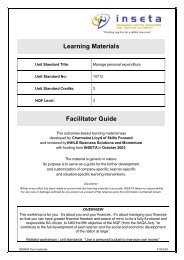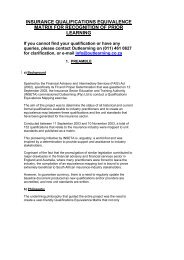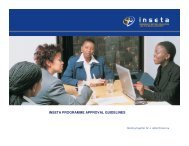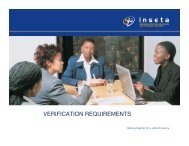SSP Brochure:Layout 1 - INSETA
SSP Brochure:Layout 1 - INSETA
SSP Brochure:Layout 1 - INSETA
You also want an ePaper? Increase the reach of your titles
YUMPU automatically turns print PDFs into web optimized ePapers that Google loves.
Globally, the role of the insurance broker has been changing over the past few years. The introduction of direct distribution channels(particularly for the short-term insurance industry) has resulted in the bypassing of broker services. In Australia and New Zealand, insurerssell most personal lines business directly to customers. Furthermore, throughout the world, banks are playing an increasingly dominant rolein insurance distribution. In the United States, banks own 10% of the country’s broker market. 17Despite the increased use of direct distribution channels, the role of the broker is actually becoming more important as internationally thedemand is growing for specialised brokers. The role of the broker has changed from one of “matchmaker” to that of service provider tothe client as well as the insurance company. In addition, broker remuneration is becoming increasingly based on service fees as opposedto commissions. 18Insurance companies are now focusing more on providing advice than on providing products, and therefore they need more sophisticated,highly skilled professionals. Recruiting and training the people needed by the insurance industry will call for more innovative approachesthan ever before. 19In order to achieve economies of scale and increase geographical reach, many independent, small and medium-sized broker firms areamalgamating and consolidating. Many smaller brokers are willing to sell their businesses because of eroding margins (as a direct result ofthe increased costs of complying with the regulatory requirements) and their inability to meet the increasing expectations of clients.In the longer term, brokers will most probably• focus on improving underwriting quality;• provide additional risk management services for their clients – it is anticipated that the risk landscape will become increasingly complex;• expand into emerging insurance markets in order to grow their businesses;• expand globally as clients demand global services;• improve their analytical skills as clients become better informed.Globally, the insurance sector is becoming more sophisticated technologically, and this is impacting on the need for skills development ofexisting employees.Environmentally, the insurance sector believes that climatic changes in the future will lead to more natural catastrophes resulting in increasingdemand for insurance cover to reduce exposure and in increasing claims emanating from such catastrophes.1.4.2 Drivers of change in South Africa’s insurance sectora) Policy and legislationMore than 140 Acts of Parliament directly and indirectly relate to and impact on the insurance sector. The sector believes that theindustry is overregulated and that this is “smothering” business initiative and limiting entrepreneurial flair. The regulatory complexityis also seen as a barrier to compliance. 20 The overregulation is also increasing operating costs and hence product pricing, which in turnis limiting accessibility to insurance products, especially for the lower income groups. Conversely, the positive effect of all the legislationis heightened consumer trust 21 and ensured that South Africa escaped the fate of countries such as the US, UK and Japan who hadto deal with the ailing health of some life insurers and are faced with the challenge of protecting consumers when companies fail. 22Currently, three aspects of policy and legislation are overshadowing all others in terms of their impact on the sector: the FinancialAdvisory and Intermediary Services Act, black economic empowerment (BEE) legislation and its corollary the sector charters andproposed changes to the life insurance industry, including the payment of commission to brokers.Financial Advisory and Intermediary Services ActThe Financial Advisory and Intermediary Services Act (No. 37 of 2002) (FAIS Act), which is aimed at professionalising the insurancesector, has had, and will continue to have, a profound impact on the sector. The Act requires all financial services providers to belicensed as such. In order to be licensed, a financial services provider has to comply with the Requirements for Fit and Proper FinancialServices Providers. These requirements are formulated in respect of• the applicant’s personal character qualities of honesty and integrity;• the competence and operational ability of the applicant to fulfil the responsibilities imposed by the Act;• the applicant’s financial soundness.The Act also imposes various other requirements on financial services providers such as accounting and auditing requirements. Largeinsurance companies in general believe that they have, or are implementing, adequate systems to satisfy the FAIS legislation. However,in many cases, companies have diverted their FAIS responsibility to the independent insurance intermediary or broker who, in general,does not have the in-house systems or ability to meet the FAIS Fit and Proper requirements. During the research and consultationprocess conducted for this <strong>SSP</strong> update, 23 it emerged that both the FSB and brokers/intermediaries and their representative bodiescontinue to be grappling with the implications of the FAIS legislation. Some of the issues raised are:17 Grant Thornton & Prodigy Business Services, Information on Financial Advisors in the South African Insurance Industry. Report presented to <strong>INSETA</strong> in November 200318 Grant Thornton & Prodigy Business Services, Information on Financial Advisors in the South African Insurance Industry. Report presented to <strong>INSETA</strong> in November 200319 Deloitte & Touche, op. cit.20 PriceWaterhouseCoopers, Emerging Trends and Strategic Issues in South African Insurance, 2006.21 Opinions expressed by industry stakeholders during the preparation of the <strong>SSP</strong> in 2004. 22 Life Offices Association, Annual Report, 200623 Company interviews conducted by Grant Thornton in 2004, and interviews conducted by EE Research Focus with industry bodies in 2005.<strong>INSETA</strong> Sector Skills Plan - page 6






